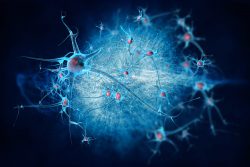 Our brain is capable of generating new neurons even late in life, an ability which plays a vital role in memory processes. Unfortunately, age and Alzheimer’s can severely impede this regenerative capacity, weakening the hippocampus’ efficiency to remember.
Our brain is capable of generating new neurons even late in life, an ability which plays a vital role in memory processes. Unfortunately, age and Alzheimer’s can severely impede this regenerative capacity, weakening the hippocampus’ efficiency to remember.
A team of researchers from the University of Zurich recently discovered that a decrease in the number of newly generated neurons is linked with aging. This occurs due to faulty distribution of proteins between daughter cells, caused by an imbalance of nucleic protein structures within neural stem cells.
With aging comes a decline in the production of lamin B1, an essential nuclear protein. Rresearchers conducting experiments on mice were able to reverse this process and revitalize stem cells by increasing levels of lamin B1. Utilizing genetic engineering and advanced microscope techniques allowed doctoral candidate Khadeesh bin Imtiaz to identify a direct connection between these processes. This could lead us closer towards unlocking our body’s full potential throughout every part of life.
The research team is working diligently to combat the effects of aging on stem cells through a variety of projects. As we age, many important regenerative processes become impaired throughout our bodies, including in brain stem cells. While this study was specific to their role, similar mechanisms likely play an influential part when it comes to other types of stem cell deterioration with age as well.
From this research, a vital leap forward has been taken in comprehending how age influences the behavior of stem cells. We’ve discovered that we can rekindle aging brain stem cells, bringing us closer to potentially boosting levels of neurogenesis. This is especially important for elderly individuals or those grappling with degenerative diseases like Alzheimer’s.
With this new knowledge, it may be possible for scientists to create solutions and therapies aimed at preserving or even re-establishing healthy neuron formation as we age.
To view the original scientific study click below:
Declining lamin B1 expression mediates age-dependent decreases of hippocampal stem cell activity





